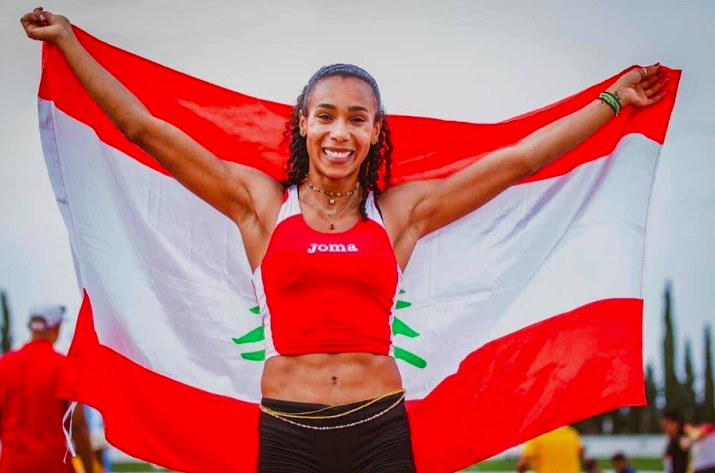
Aziza Sbaity hoisting a Lebanese flag. (Credit: National News Agency)
“At first, I thought it was a mistake.” Scrolling through her email inbox, Aziza Sbaity needed a little time to digest the news she had just received from the BBC: She is among the 100 inspiring and influential women from around the world in 2023.
“I thought it was just a shortlist and that in the end I wouldn’t be selected,” the sprinter told L’Orient-Le Jour. “Then, when I saw the final list ... I couldn’t believe it.”
“It’s a huge honor to be recognized for something other than my athletic achievements,” she said. “It’s crazy to think that the social dimension of what I do off the track can have such a wide resonance,” she added.
The aim of the selection is to shed light on a 100 figures who “achieved something significant or influenced their societies in ways that wouldn’t necessarily make the news,” BBC wrote on its website.
The list includes world-famous names such as Michelle Obama and Amal Alamuddin Clooney, the British-Lebanese human rights lawyer, as well as numerous authors and activists focusing on feminism and climate issues. It also includes leading sportswomen such as Spain’s Aitana Bonmati, the world champion footballer who won the Women’s Ballon d’Or.
A life filled with battles
Born in Monrovia in 1991 to a Liberian mother and Lebanese father, Aziza Sbaity moved to Lebanon at the age of 10. This exodus was forced by the upsurge in civil war that ravaged Liberia between 1990 and 2000. This put her in a rather special category, at that time anyway: People who had to flee to Lebanon and not from it.
But it was not long before the young woman had to defend herself against another form of violence: Racism. “School was a nightmare for me. As the only black girl in my class, I was harassed every day. I came home in tears, so much so that I asked my father to take me back to Liberia with him,” she said.
Thanks to the support of her parents, as well as her mother-in-law, with whom she grew up in Kafra, Bint Jbeil district, the young Aziza resorted to sports to assert herself on a personal level and better cope with the discrimination to which she is still subjected. For example, this time in 2021, a customs officer at Beirut airport questioned her Lebanese identity because of her physical appearance.
“Lebanon still has a long way to go on this issue,” she said. “It’s a daily battle that I hope to advance in my own way: Representing Lebanon in the best possible way on the international stage.”
...and records
After earning the respect of her classmates by winning all races organized at her school, including against boys, the teenager became aware of her extraordinary physical abilities and devoted herself, her body and soul to athletics once she was enrolled in the International School of Choueifat — SABIS at the age of 16.
Then, by dint of her efforts and races across the globe, she ended up becoming “the fastest woman in Lebanon” when she broke Gretta Taslakian’s 100-m national record for the first time on July 9, 2018 in Amman, Jordan, during the West Asian Championships, lowering it to 11’73 seconds.
“It’s a moment that will always be engraved in my memory. Even though I’ve beaten this record five times, most recently last April in a race in Germany, which I won in 11’54, I don’t think I’ve ever felt such strong emotions,” she said.
In addition to her collection of other national records (60m, 300m and 4x100m relay), the 32-year-old athlete has raised the cedar-stamped flag many times on the top steps of the most prestigious podiums. Particularly this season, “one of the best of [her] career,” at the West Asian championships and the Arab games, where she won the gold medal. She now has just one dream left to fulfill: Represent Lebanon at the Olympic Games.
A duty to set an example
After missing out on the Tokyo Games in 2021, Aziza Sbaity said she will give “everything [she’s] got” to secure the Lebanese Athletics Federation’s only ticket to the Paris Games next summer, for both men and women.
Accustomed to drawing strength from adversity, the sprinter has already begun her preparations alongside her loyal coach, Georges Assaf. She resumed her long journey three weeks ago after a long break in the United States, where she spent time with her mother, who is currently battling cancer. “This is where I find all my energy and motivation,” she said.
However, the fighting that raged for more than a month and a half in her home area of southern Lebanon, and the growing death toll in the Palestinian territories, have dented her serenity. Her village, Kafra, was also targeted two weeks ago by an Israeli drone strike.
“It’s very hard not knowing what’s going to happen to your house, feeling the pain of the people who have stayed in the South,” she said. “But it’s our duty as sportsmen and women to rise above these negative emotions and give our best to qualify for the Olympic Games. Because it’s in situations like these that it’s even more important to spread the word about Lebanon in a more positive way.”
This article was originally published on L'Orient-Le Jour. Translated by Joelle El Khoury.